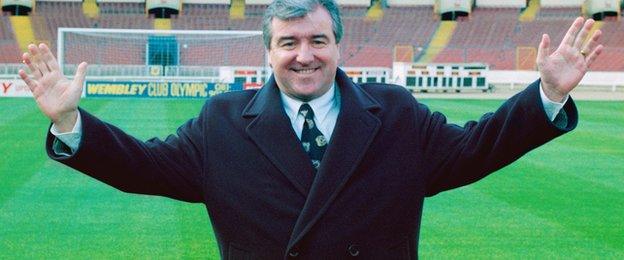Transfer deadline day: 10 ways to get a good deal
- Published
Transfer Deadline Day: Jake Yapp's two-minute take
How do you get a player the best deal on transfer deadline day?
Do you get your business done early, or drag it out until the last minute? What tricks of the trade can an agent use? How do you keep your player happy? What kind of clauses/add-ons go into a contract?
BBC Sport spoke to David Seligman, an agent at CM Sports in Manchester and an expert in sports law, and renowned agent Eric Hall for some insight into the type of last-ditch negotiations that occur when the transfer window is about to shut.
Seligman currently represents a number of Football League players while Hall's client list once included the likes of England internationals Dennis Wise, Tim Sherwood and Neil Ruddock.
Take it to the wire - 'ask for everything'

Eric Hall has been a prominent football agent for the last two decades
"If it gets to deadline day, you know there isn't any time for the club to go and get somebody else, so the price goes up and you get them the better deal," says Seligman.
"If you talk to your Harry Redknapps, Alex Fergusons and Terry Venables, they won't wait until deadline day if they fancy a player," says Hall. "Deadline day just gives people like me and the players extra ammunition.
"On deadline day, you just go 'chat, chat, chat, chat'. Keep them chatting until you're near to that deadline hour and then they will give you anything, within a certain reason, that you want. Ask for everything because as silly as some stuff may sound, you'll probably get it.
"I remember quite a few years ago, I took Kenny Sansom from Arsenal to Jim Smith and Newcastle and I got three times more than I probably should have got."
Seligman adds: "I negotiated a lower league player's release from his contract at one club in January and we were offered £5,000 to cancel his contract two days before the window closed.
"We waited and one hour before the window closed I got him double that. We were playing a game of chicken - we kept saying we wouldn't accept it - and it went down to the wire and the price went up."
It is a power game - who has got it?

David Seligman is a licensed agent with the Football Association
"It's all about assessing who has the power - the club or the player," says Seligman. "I once represented a player who had not scored a goal for a long time but he had played at a high level so, in his head, he wanted to earn a certain amount of money.
"I eventually got him £2,500 a week after one club had initially offered £700 a week. He got a £10,000 signing on fee, too. From my point of view, when I first touted the player to the manager concerned, he was very interested. I gauged that by the fact he rang me back 25 minutes later after he'd done some digging and watched some videos.
"He said there and then there would be an email with a contract offer within the hour. At that point, I knew I had the power - he was the club's number one target."
Strike a balance - 'you don't want to lose a deal'
"When you're dragging it out a little bit, that's where an agent really has to earn his corn," says Seligman. "You have to find the right balance between keeping the player happy and making sure the deal is not lost.
"A conversation needs to be had with the player on how far they want to push it, because it's their career. If you get to a point where the player says they don't want to push it too far, then you have to agree and take the deal that's on the table.
"This is where a good agent and a bad agent are separated because if you're a good agent, you are able to analyse the situation and use your contacts in the game to see if a club is speaking to other players and get the player to trust you.
"You don't want to lose a deal, but you don't want to cave too early."
Play clubs off against each other

Tim Sherwood was at the centre of a deadline-day battle for his services before signing for Blackburn
"There's no point in being underhand," says Seligman. "You play them off against each other by being honest. If they think another club is interested it can ramp the wages up."
Hall recalls: "I took Tim Sherwood up to Blackburn a few years ago. The same day, I was doing a deal with Derby where Arthur Cox wanted to sign Tim (who was at Norwich at the time).
"I was playing games with my lovely mate [then Rovers manager] Kenny Dalglish and I kept him hanging on. You play one against the other. But if you're good at your job, you shouldn't play too many games. You mustn't underestimate chairmen either because most have the money to buy a club because they are good businessmen. They are not idiots."
Bring the player's family into it
"Another trick is to say the deal if off by saying the offer is unacceptable," says Seligman. "Or you can bring a player's family into it and say the player can't justify the travel because he's got a young family, and then the club say they'll put him up in a flat and help out with that. If the club really want the player it is important to not only look after him but his family too.
"Conversely, I had a player last summer who was offered 50% more than what he was earning at the time elsewhere but he turned it down because his girlfriend couldn't move. That's just the real world - she couldn't move in her line of work."
Tell them a few home truths
"I had one player who wouldn't take a second year at a club because he thought he would get a bigger move and earn more money elsewhere - on the advice of his wife," recalls Seligman. "He got paid up after six months.
"I've had a lot of English lads who are small and they say to me they want to make it in Spain," says Seligman. "'The game is better suited to me in Spain', 'my dad said it'd be better for me in Spain' but I tell them that if they are good enough to play professionally in Spain, they are good enough to play professionally in England.
"People don't like being told a few home truths, but as an agent you have to balance it. You're dealing with human beings who are temperamental and footballers can be more temperamental and egotistical than most."
Use the media to your advantage
"It can be useful to use media stories and hype too," admits Seligman. "If a player gets talked about a lot, whether it be on social media or in the press, there is more attention attracted to them.
"If you have a player who is spoken about a lot, you have people wanting to watch him. I had a player who was scouted by a Championship club (he eventually signed for another Championship club) because there were just so many people talking about him and they didn't want to miss out. You have to create that 'don't want to miss out' philosophy.
"I've put out stories before now saying that my client has been watched by three or four clubs in a higher division because (a) it's true and (b) it raises their profile."
Get your player tweeting

"If you're a player at a club and you're always giving away your boots, the fans will love you," says David Seligman
"I've already told my players to build up their Twitter following over the next few months and when it comes to negotiations, we can get clauses built in there," says Seligman.
"If you're a player at a club and you're always giving away your boots, shirts and signed stuff, the fans will love you. Becoming a fans' favourite gives you more power, it helps when you're negotiating a new contract.
"Also, you can go to a club on a commercial level and say 'Look, I've got 20,000 followers on Twitter and you can put promotions out via my Twitter feed. That can aid the club, and in return I want an extra £100 a week.' That's a more innovative term in a contract.
"If you have two identical players and you're not sure which one to choose but there's one who you can make more money out of commercially, social media is a new way of doing that," adds Seligman.
"We've seen financial analysts and pundits justifying high transfer fees and wages for Gareth Bale at Real Madrid and David Beckham at LA Galaxy by the amount of shirts they sell. It's that but on a smaller scale. It's all about making more money."
Ask for a few add-ons
"I had a player called Richard Duffy, who was on loan at Coventry from Portsmouth," says Hall. "His loan was due to finish about a week before the deadline and then I got a call from Coventry.
"They said they wanted to keep my player until the end of the season. I said 'That's great, if Portsmouth agree, but I want three times more for his wages, plus this, that, a car and a little house for him to live with his girlfriend.'
"Because it was a couple of days before the window was going to shut, and Coventry were struggling at the time, they came up with it."
Seligman adds: "A lot of the time, I get my client a relocation fee or expenses. I use a guy who is really good at relocating players. He sources everything like schools, nurseries… whatever is necessary. Anything which makes a player comfortable should, in theory, make him play better."
Throw in a performance bonus

Hall asked Terry Venables to include a goal bonus in a contract for a goalkeeeper
"The things that tend to work well for my clients are to get things like performance bonuses worked into the contract," says Seligman. "You can get a goal bonus - £100 per goal, £200 per goal, etc, or 10 goals can earn you £1,000. Clubs prefer that - to do it per five, 10 or 15 goals - but as an agent I'm not a fan of that.
"I had a big argument with a chairman at a Conference club once. He proposed my client got a £2,000 bonus if he got 20 goals - £100 a goal really - but I said I didn't like that because if he scores 19 goals and gets 10 assists you're going to be delighted with him but he won't get his bonus.
"His reply was that he'd sort something out but that wasn't good enough - it's all well and good saying that in August, it needs to be in the contract."
Hall recalled: "I remember saying to Terry Venables [on one particular deadline day] that I wanted my player to get £5,000 if he scores a goal. He was a goalkeeper!"
- Published2 February 2015

- Published2 February 2015

- Published2 February 2015

- Published1 February 2015

- Published31 January 2015
